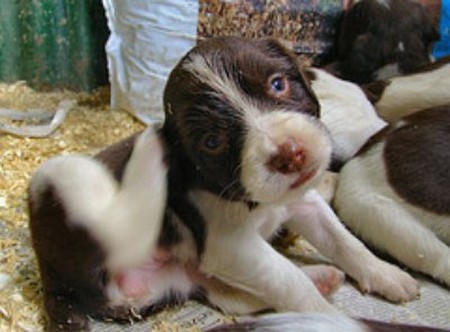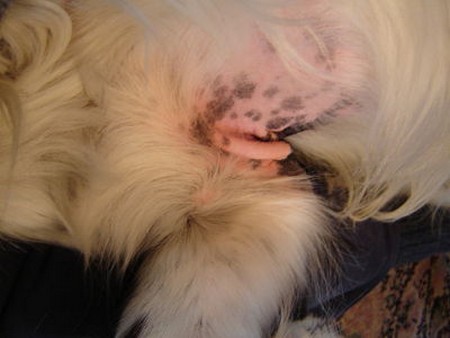Most allergies are inherited but some may be activated by exposure to certain irritants. It is wise to examine your dog regularly and keep a record or your observations.
Symptoms
Itching is usually the first sign of an allergy. Moist or dry eczema follow, as well as swelling and reddening.
Other typical signs are watery eyes, a runny nose, coughing, vomiting, or diarrhea.

If the dog is reacting to a medicine or to overmedication, the animal’s head may swell up. This looks like the dog’s head is enlarged, and you will notice thick folds on the forehead.
Causes
The animal could react to a variety of agents: environmental agents such as pollen or dust; medications; food components like wheat, milk, or the ingredients of commercial dry or canned food; and, last but not least, insect stings.
Self-Help
You should feed your dog a special diet.
Important: Avoid food that contains poultry and veal because these meats could increase the itching.
- Home Remedies
Oral administration of Engystol ampoules will induce an unspecific detoxification process in the body. Pro-Alert drops will regulate a variety of metabolic disorders, and Cosmochema Skin Function drops are very effective in diminishing the itching problem.
To treat a localized swelling or irritation like an insect sting, you can orally administer ampoules of Apis-injeel.
Thuja D30 is indicated for a reaction to a medication.
Firebase-Calcium ampoules are highly effective for all sorts of allergic reactions.
- Bach Flowers
Whatever the cause, give your dog crab apple. Hornbeam will lift the spirit of a listless patient and cherry plum is indicated for a dog that is getting highly agitated because of bad scratching fits.
When to Consult a Veterinarian
If the allergic reaction continues beyond two or three days, a veterinarian specialist should be contacted to establish the origin of the problem. Get help immediately if the general condition of the animal worsens.
What to Expect
Homeopathic remedies will strengthen the overall condition of the dog while the use of Nosode therapy will eliminate toxins from the body. In some cases the use of desensitization injections may be indicated. This treatment is not available everywhere.

Preventive and Convalescent Care
If your dog tends to have allergic reactions, you should, above all, make sure that the diet contains as little chemical preservatives as possible. A good balanced diet is the top requirement.
Breed Dispositions
German shepherds, poodles, boxers, and Dalmatians tend to have more allergies than other breeds.